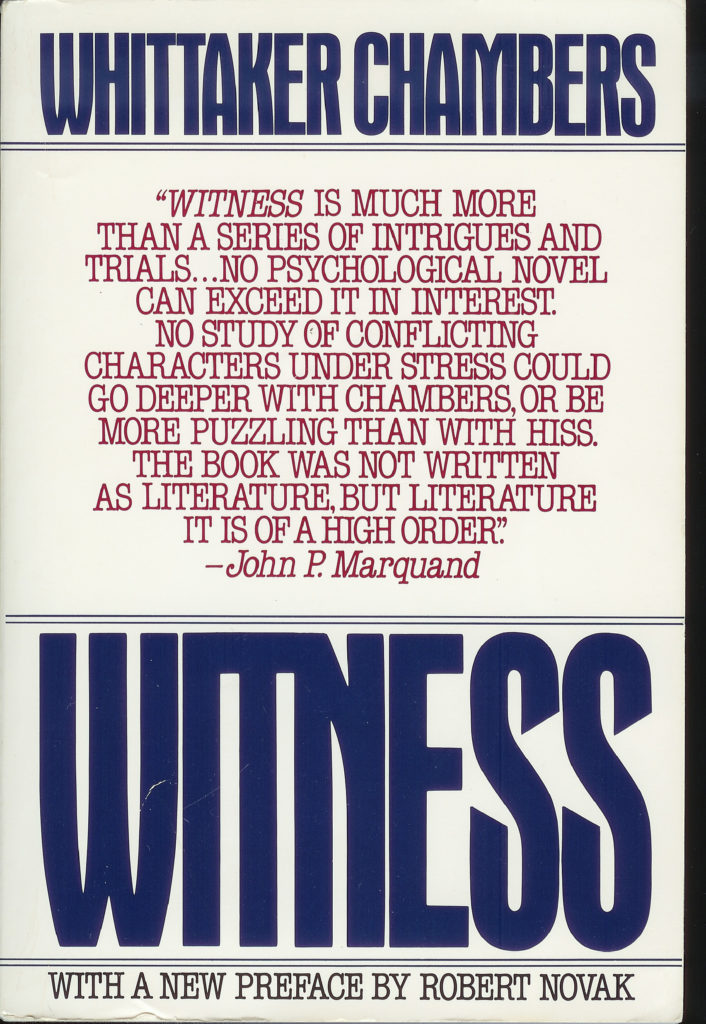Over the years, I’ve taught my “Witness of Whittaker Chambers” course many times. It never gets old or stale; in fact, each time I sense that the Lord uses it to help me see even more of His mercy and grace. The life of Whittaker Chambers exemplifies God’s grace while simultaneously challenging readers of his masterful autobiography, Witness, to seek ever more earnestly the face of God.
In teaching the course this semester, the depth of Chambers’s personal path and the lessons he had to learn stand out starkly. For those unfamiliar with his life’s story, I’ll briefly summarize.
He grew up in a dysfunctional family with a brother who committed suicide and a father who expressed no love for him at all. Christian teaching in his early years was virtually nonexistent. The despair in his heart and the hopelessness of a world ravaged by WWI led him to the communist ideology. He eventually became part of the underground communist organization in America that sought to place communists in government to influence policy favorable to the Soviet Union and to commit espionage.
Stalin’s Great Purge of one million members of the Communist Party from 1936-1938 shook Chambers. He concluded that the vision he had embraced was, in reality, monstrous in practice. He broke from the underground, thereby putting his life and the lives of his family in grave danger. After WWII, he offered his witness to Congress, which gave rise to one of the trials of the century, that of Alger Hiss, who was one of Chambers’s underground colleagues and a high official in the State Department during the war, seeking to do whatever Stalin needed.
When Chambers broke from communism, it was a wrenching decision. He explains it this way:
It was no simple act. As he noted, one doesn’t reverse a faith one has held for most of one’s life easily. One must be convinced of the necessity to do so. As he made that break, he was transitioning from the communist worldview to the Christian worldview. He wasn’t there yet, but God was drawing him closer:
We live in shrouds. What a poignant comment. Life without God is actually death. Then followed one of the most humble statements a man can make:
Due to his superb writing, he found a job at Time magazine where he later became one of the senior editors. He had to start at the bottom, though, and work his way up. With his new Christian conscience, he sought to warn against communism through his writing, but resistance to his message was strong. Frustrated at first, he finally realized that he was taking the wrong approach:
That lesson—emphasize the positive rather than constantly being on the attack—is one that conservative commentators who claim the Christian mantle might take to heart today. Chambers’s changed approach was the direct result of his burgeoning faith. As he wrote,
Those words are timeless: they apply just as much today. Formless good will is not real Christianity. Social uplift is nice, but it’s not the essence of the faith, only a consequence. Ethics—how we treat others—can only be genuine if grounded in the faith. What we need is a heart for God Himself and a desire to put faith in Him into action. Chambers had to transfer his lifestyle from that of a practicing communist to that of a practicing Christian.
The life chosen by Chambers after his reversal of belief was not an easy one. The decision to make his witness to the world came with a cost. His time in the underground could have been an adequate reason to prosecute him for his actions against his own government. He lost his job at Time. The stress of testifying and going through a lawsuit brought by Hiss and the court trials affected his health. Shortly after completing his autobiography, he suffered a heart attack from which he never fully recovered. His death at age 60 was hastened by everything he went through. Yet he consciously chose this path because he believed it was what God appointed him to do.
I highly recommend reading Witness. I would also point to my book that compares the lives of Chambers and Ronald Reagan, the latter having been deeply impressed with Chambers’s witness. Most people in our day know nothing of Whittaker Chambers. That is a shame. His story is a classic of God’s redeeming mercy and grace.








